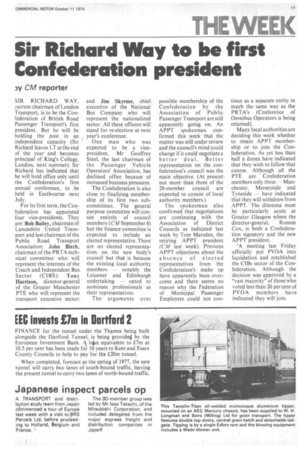Sir Richard Way to be first Confederation president
Page 19

If you've noticed an error in this article please click here to report it so we can fix it.
py CM reporter SIR RICHARD WAY, urrent chairman of London Transport, is to be the Confederation of British Road Passenger Transport's first president. But he will be holding the post in an , independent capacity (Sir Richard leaves LT at the end of the year and becomes principal of King's College, London, next summer). Sir Richard has indicated that he will hold office only until the Confederation's first annual conference, to be held in Eastbourne next July.
For its first term, the Confederation has appointed four vice-presidents. They are: Bob Bailey, chairman of Lancashire United Transport and last chairman of the Public Road Transport Association: John Birch, chairman of the PRTA technical committee who will represent the interests of the Coach and Independent Bus Sector (CIBS): Tony Harrison, director-general of the Greater Manchester PTE who will. represent the transport executive sector: and Jim Skyrme, chief, executive of the National Bus Company who will represent the nationalized sector. All these officers will stand for re-election at next year's conference.
One man who was expected to be a vicepresident, Mr Geoffrey Steel, the last chairman of the Passenger Vehicle Operators' Association, has declined office because of increased business pressures.
The Confederation is also close to finalizing membership of its first two subcommittees. The general purpose committee will consist entirely of council members (CM September 6) but the finance committee is expected to include an elected representative. There" are no elected representatives on the new body's council but that is because the existing local authority members — notably the Leicester and Edinburgh undertaking — opted to nominate professionals as their representatives.
The arguments over possible membership of the Confederation by the Association of Public Passenger Transport are still apparently going on. An APPT spokesman confirmed this week that the matter was still under review and the council's mind could change if it could negotiate a better deal. Better representation on the confederation's council was the main objective. (At present, not more than three of the 28-member council are expected to consist of local authority members.) The spokesman also confirmed that negotiations are continuing with the Association of District Councils as indiCated last week by Tom Marsden, the retiring APPT president (CM last week). Previous APPT objections about the absence of elected representatives from the Confederation's make up have apparently been overcome and there seems no reason why the Federation of Municipal ' Passenger Employers could not con tinue as a separate entity in much the same way as the PRTA's (Conference of Omnibus Operators is being retained).
Many local authorities are deciding this week whether to retain APPT membership or to join the Confederation: As yet less than half a dozen have indicated that they wish to follow that course. Although all the PTE are Confederation members only three — Manchester, Merseyside and Tyneside have indicated that they will withdraw from APPT. The dilemma must be particularly acute at Greater Glasgow where the director-general, Ronnie Cox, is both a Confederation signatory and the new APPT president.
'A meeting last Friday officially put PVOA into liquidation and established the ClBs sector of the Confederation. Although the decision was approved by a "vast majority" of those who voted less than 20 per cent of PVOA members have indicated they will join.




























































































































































